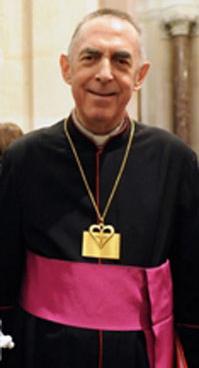 LOURDES — Leading bishops have voiced alarm at a rise in anti-Islamic sentiment in France and admitted that hardening attitudes within the Roman Catholic church are fuelling the trend.
LOURDES — Leading bishops have voiced alarm at a rise in anti-Islamic sentiment in France and admitted that hardening attitudes within the Roman Catholic church are fuelling the trend.
In comments that will add to pressure on President François Hollande to respond to demands from France’s large Muslim community to speak out on the issue, the Bishop of Angoulême, Claude Dagens, said he was profoundly concerned by recent developments.
“It is with much pain that I notice the emergence of a Catholic Islamophobia, in the same way that there has been a Catholic anti-semitism for centuries,” Dagens told AFP in an interview on the sidelines of an assembly of French bishops here.
Dagens said his concerns had been heightened by the controversial “Muslim demographics” presentation made at the Vatican last month in which Cardinal Peter Turkson predicted that Islam would eventually become the dominant religion in Europe.
The Vatican subsequently distanced itself from a film which included a claim that France could have a majority of Muslims within four decades, but Dagens acknowledged that the episode reflected a worrying shift in attitudes. “We are living in a society where fear is seeping into every corner. That’s true for Muslims but also for Catholics.”
Dagens comments, echoed by a number of his colleagues here, came in the wake of a call by France’s Muslim Council, the main representative body for the country’s estimated five million Muslims, for the President to publicly condemn Islamophobia.
Behind the call lies resentment based on a perception that Hollande and his ministers have given greater priority to combatting a recent rise in anti-semitism than they have to defending the Muslim community in the face of a parallel trend.
Earlier this month, Hollande vowed that France would wage a relentless fight to eradicate anti-semitism from society, describing it as a “national cause.”
Abdellah Zekri, one of the leaders of the Muslim Council, called for France’s Islamic community to be offered similar support.
“Given the rise in the number of Islamophobic acts and anti-Muslim racism, we want a formal declaration from the President of the Republic that includes the Muslims of France in this national cause,” Zekri said.
Government ministers have issued strong condemnations of high-profile anti-Islamic acts such as the desecration of mosques and pledged to do more to address the economic and social problems that afflict the country’s Muslims more than the rest of the population.
But government pronouncements on the subject have almost invariably been qualified by warnings that the Islamic community must be vigilant about the development of radicalism within its ranks, which it has linked to both an emerging threat from homegrown terrorism and to the resurgence of anti-semitism.
Fears that a militant minority of young French Muslims represent a security threat have been fuelled by Islamist gunman Mohammed Merah’s killing of seven people in Toulouse in March and by last month’s dismantling of what the authorities described as an Islamist terrorist cell.
These episodes are seen as having hardened the attitudes of many French people towards their Muslim compatriots while exacerbating the minority community’s sense of their culture and religion being under siege from the authorities and the rest of society.
Many Muslims have been angered by legislation which bans women from wearing full veils, arguing that it has led to increased hostility to any public display of their faith, while this year elections were marked by a divisive debate over the use of halal methods of animal slaughter.
